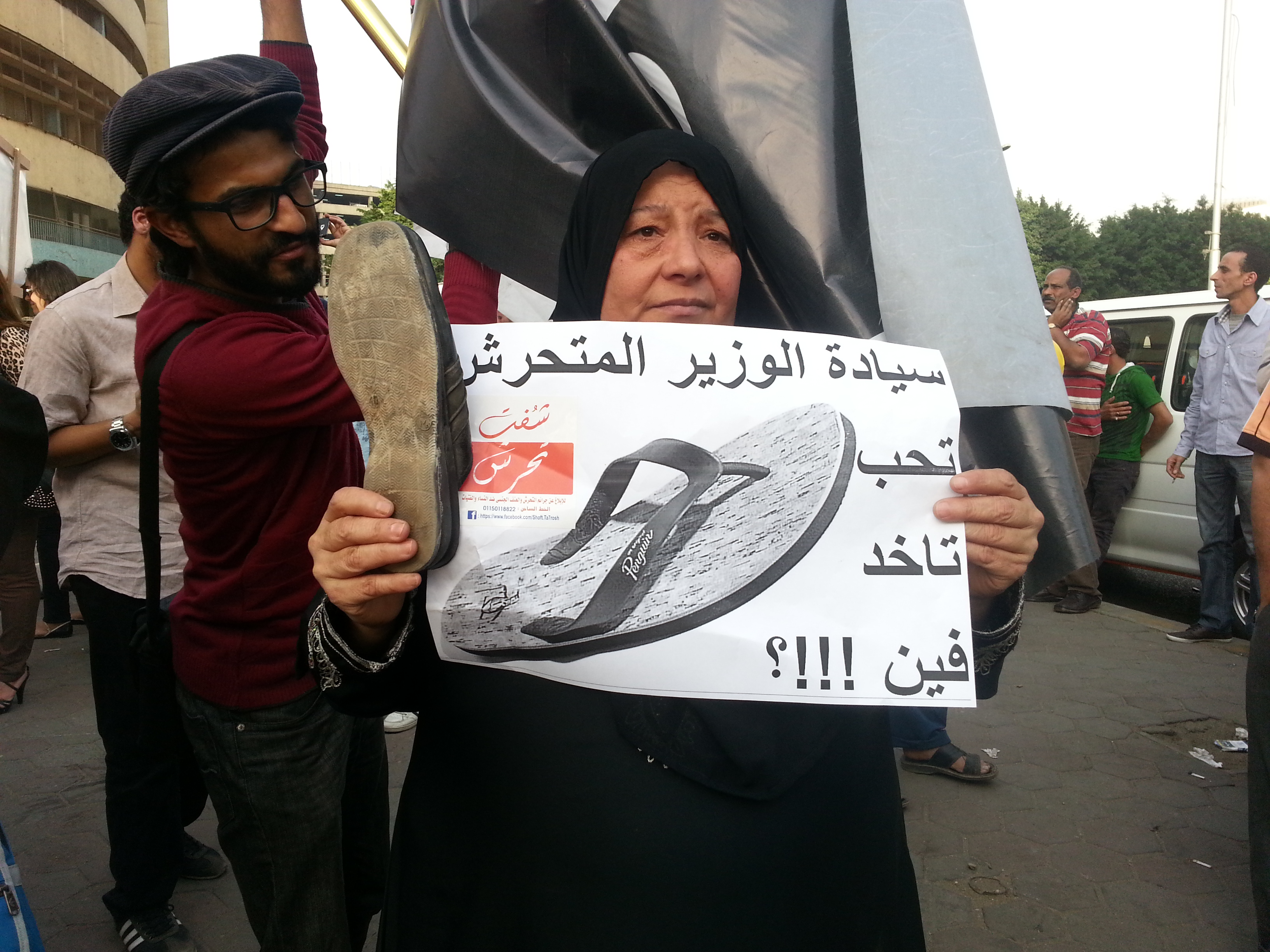
A friend had to go to the police station by the Rabaa Al-Adaweya sit-in for some documents, and there was no escape but to go through the thousands of protesters stationed in front of the Nasr City police station.
My friend said: “it is a city of a parallel world”; posters of ousted president Morsi are all over and he is treated like “a prophet, a holy man”. Ongoing announcements of the imminent victory of Islam and discussions on whether defence minister Al-Sisi will escape the country or will be murdered were taking place between groups of protesters. In the middle of all this, an announcement was made about a Shura Council session taking place in the vicinity of the sit-in, without any regard to the fact that the council was dissolved by presidential decree.
According to my friend, the “Rabaa city” is composed of a large number of tents, without any diversity among those protesting; almost all of them come from lower income rural backgrounds. The sit in has men, women and children moving freely in the small city of tents, as if they have always lived there.
As many reporters recount their experience in walking in the tent city of Rabaa, their first remark is that the protesters at the sit-in are completely isolated from the rest of the country. With their own radio station broadcast from the stage they built, news arrives to them filtered and unreal. They are being told that the whole country is protesting by the millions. They are being told that they are winning, that their Islamic Caliphate is being formed, that the Egyptian army is losing and that the whole world supports them. That is what they keep hearing, day and night!
What happens when this sit-in is over? Of course, the means of ending it remain a mystery to most of us. There is the most optimistic scenario of them just leaving and heading back to their homes, after realising that their demonstrating is pointless and will not yield results. This is highly unlikely, given the continuous “media” announcements and speeches filling the air around them. Their “media” tells them that “Victory is near”, and that “Islam will definitely win”.
The other peaceful scenario is if their leaders decide to finally strike a deal, as they have always done throughout their history as an underground organisation. Some smart man in their ranks might come up with terms that can be met by the country leaders. This is also unlikely, one can tell from their speeches. They probably know that if they give in now, they will lose a lot of credit with their supporters. Also the risk of imprisonment, or even going back underground and starting all over again in building up for their presence in the political scene, make it quite unlikely that they would go for a deal. So far, they have refused all calls for dialogue or inclusion in the new cabinet.
The worst, but quite likely, scenario is a government crack-down on them; they continue to block major Cairo streets, residents of Nasr City are imprisoned in their homes, and their streets are filthy (a normal outcome of thousands living on the streets). Also, Islamists are creating havoc in Sinai as well as occasional clashes erupting in several governorates across Egypt, on top of the killings of Christians in the past week, which is likely to escalate in the coming weeks. The fact that the protesters are not given proper attention by the media or the people of Egypt at large is probably a cause of rage among their ranks. And rage breeds violence. They will, eventually, become fed up and start provocations that will result in a violent response from the military. The military, with the exception of the Republican Guard incident (which in my opinion was a display of excessive use of force), has shown restraint. But after the horrendous incidents in Sinai, do we still expect the military to exercise restraint?
We know the military’s response is always violent (much like every other army) and their excessive use of force was clear in several incidents against protesters after the 25 January Revolution. There is no reason to believe that when they do respond now it will be different. What was done to 25 January revolutionaries is likely to happen again with Islamist protesters, maybe even tenfold for many reasons (least of which is the not-so-peaceful nature of their protests). One should also consider the fact that most Egyptians are not exactly sympathetic towards Islamists, after they witnessed how they rule and fight (the Manial and Cairo University clashes will not be forgotten).
A short discussion I had with an uneducated woman revealed a lot to me. She had just struggled through the traffic fiasco in Nasr City and told me she hopes the army would “do something” about it. I said that the army only uses force, and when they did interfere, over 50 people got killed at the Republican Guard clashes. Her response was: “So what? Let them die, why did they have to go attack an army institution?” I reminded her that revolutionaries protested by the interior ministry and were killed yet we did not tolerate their killing, how can we accept this now? That would be hypocrisy. She said: “Well, those who were killed by the MOI were fighting for us, for the poor, yet their blood was in vain…why should I care about the blood of Islamists who ruined the country after we were given hope for a better future?” After all the blatant lies and failures, most Egyptians are completely disregarding those protesters who live in a parallel world where they perceive that their religion is under threat.
What happens when the sit-in ends? Regardless of how it comes to an end, these thousands will go back to their villages and cities, back to their homes and mosques and preachers. Back to being an underground group and their isolation would remain as it is now at the tent city. In the past, many Egyptians had sympathised with Islamists because of how they were persecuted by the government, the military trials they faced and the detentions and abuse they endured. But now it is different; they are no longer tolerated.
Unless the coming rulers of Egypt pay extra attention to these groups, things will get out of hand. A complete rehabilitation is needed for the thousands of followers; a whole new education should be set in place. We need to remember that these thousands are scattered across the country so a nation-wide plan is required. The government should make sure they are eased into our new world, bring them out of their isolation and teach them to coexist with the rest of Egypt.
After all the hate speech, the incitement of violence and the blood spilled in Egyptian streets, their leaders are likely to face charges, but what about the followers? Chances are if we continue to disregard and/or persecute these thousands they will become even more extreme in their ideas than they are now, and the possibility of violence will rise, especially now that their dream of an Islamic Caliphate in Egypt has been crushed. The whole Egyptian society, along with the government, should find a way to reach out to them and put an end to their isolation. Or else, the consequences will be grave!



